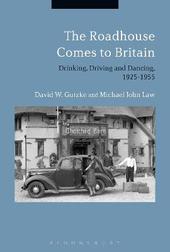
|
The Roadhouse Comes to Britain: Drinking, Driving and Dancing, 1925-1955
Hardback
Main Details
| Title |
The Roadhouse Comes to Britain: Drinking, Driving and Dancing, 1925-1955
|
| Authors and Contributors |
By (author) David W. Gutzke
|
|
By (author) Dr. Michael John Law
|
| Physical Properties |
| Format:Hardback | | Pages:192 | | Dimensions(mm): Height 234,Width 156 |
|
| Category/Genre | British and Irish History |
|---|
| ISBN/Barcode |
9781474294508
|
| Classifications | Dewey:306.09410904 |
|---|
| Audience | | Tertiary Education (US: College) | |
|---|
| Illustrations |
20 bw illus
|
|
Publishing Details |
| Publisher |
Bloomsbury Publishing PLC
|
| Imprint |
Bloomsbury Academic
|
| Publication Date |
20 April 2017 |
| Publication Country |
United Kingdom
|
Description
This is the first book to examine the cultural phenomenon of the roadhouse in mid 20th-century Britain and its impact on British leisure. The term 'roadhouse' was used in varied ways in the 1930s, from small roadside tearooms to enormous establishments on the outskirts of major cities. These roadhouses were an important component in the transformation of leisure in the 1930s and beyond, reflecting the increased levels of social and physical mobility brought about by new technologies, suburbanisation and the influence of American culture. Roadhouses attracted wealthy Londoners excited by the prospect of a high-speed run into the countryside. During the day, they offered family activities such as tennis, archery, horse riding and swimming. At night, they provided all the fun of the West End with dancing, classy restaurants, cabaret, swimsuit parades and dance demonstrations, subverting the licensing laws to provide all-night drinking. Rumours abounded of prostitution and transgressive behaviour in the car park. Roadhouses formed part of an imaginary America in suburban Britain that was promoted by the popularity of American movies, music and fiction, providing a pastiche of the American country club. While much work has been done on the Soho nightclubs of the 1930s, the roadhouse has been largely ignored. Michael John Law and David Gutzke fill this gap in the literature by providing a comprehensive analysis of the roadhouse's cultural meaning, demonstrating how its Americanisation was interpreted for British consumers. This original and engaging study will be fascinating reading for all scholars of 20th-century British cultural history.
Author Biography
Michael John Law is Research Fellow in History at the University of Westminster, UK. He is the author of The Experience of Suburban Modernity: How Private Transport Changed Interwar London (2014). David W. Gutzke is Professor of History at Missouri State University, USA. His most recently authored book is Women Drinking Out in Britain since the Early 20th Century (2014).
ReviewsAn important, enlightening and racy book on a racy topic which demonstrates convincingly the link between Americanisation, class, fashion and fad in the age of the growth of motoring in Britain during the inter-war years. It should be read widely for both pleasure and academic interest. * English Historical Review * One of the great strengths of the volume is the richness of the numerous illustrations and the use of novels, short stories, films, plays, roadhouse newsreels, and newspaper and magazine articles. The sources make this a compelling account of the short life of the roadhouse as well as a significant and overlooked part of interwar domestic tourism and the role of the car in the development of middle-class leisure. This is a highly readable volume that will be very useful in the classroom. The book will also appeal to a wide audience, including scholars of twentieth-century British and American popular culture. * American Historical Review * This interesting and important study adds significantly to the historical and anthropological literature on alcohol and drinking spaces in society ... Roadhouses were so deeply ingrained in the romantic imagination of British high society during the interwar years that they helped define a generation. Summing Up: Highly recommended. All levels/libraries. * CHOICE * This fascinating book offers a vivid insight into a neglected subject of the interwar period. * Brewery History * This is a pioneering and fascinating book on the brief interwar moment in elite leisure. It is a well-conceived and well-researched imaginative definition of a topic that references the wealthy and adventurous Bright Young Things and their fast cars, as well as homosexuality, anti-Semitism, and black jazz musicians who bring back memories of Downton Abbey. * David M. Fahey, Professor Emeritus of History, Miami University, USA. * Motor-cars, society between the wars and ideas from American films came together to produce the English roadhouse, an altogether more exclusive place than the American version, though it always pretended to have a bit of the wickedness of defying Prohibition about it. The Roadhouse Comes to Britain brings together this mixture of frailties in an informed and informative way without losing any of the entertainment value of the story. * Trevor Lloyd, Emeritus Professor of History, University of Toronto, Canada * The interwar roadhouse has been shamefully neglected by historians, but now it has the scholarly attention it deserves. Both subversive and suburban, the roadhouse offered Americana, alcohol, music, petrol, and sex in the car park. Mellifluous in style and meticulous in detail, The Roadhouse Comes to Britain makes a major contribution to the social history of interwar Britain, and also shines new light into an earlier era of the night-time economy of London. * Mark Clapson, Professor of Social and Urban History, University of Westminster, UK *
|